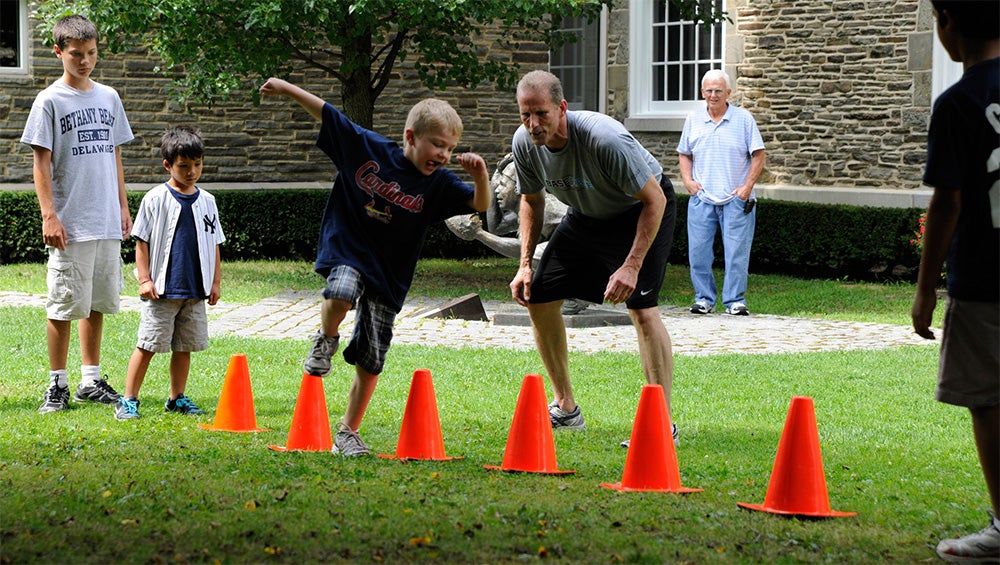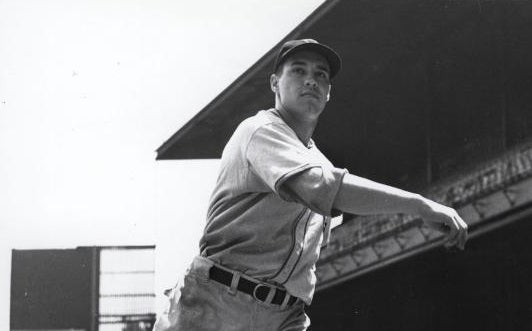Every day is a new opportunity. You can build on yesterday's success or put its failures behind and start over again. That's the way life is, with a new game every day, and that's the way baseball is.
Hall of Famer Bob Feller

HEALTH SCIENCE: BE A SUPERIOR EXAMPLE (BASE)
The choices we make each and every day affect our lives and the lives of the people around us. In this unit, students explore how decisions related to fitness, nutrition, character and fair play affect their overall physical, mental, and social well-being. Through lessons and activities that reinforce positive decision-making, participants gain an understanding of tools that are needed to succeed in athletics and life, and how they can Be a Superior Example in their own community.
THEMATIC UNIT OBJECTIVE
- Gain an overall awareness of how the decisions they make affect their physical, mental and social well-being.
- Explore real-world examples of athletes who have made responsible decisions to maintain a healthy lifestyle.
- Examine health issues facing their own communities and work towards ways to address those issues
- Each lesson is designed to meet national and New York state standards for the subjects of physical education, science, and health.
ROOKIE (GRADES 3-5)
LESSON 1 (PRE-VISIT): THE ATHLETE’S BODY
Students discuss the concept of physical fitness focusing on the importance of building speed, agility, flexibility, strength and endurance.
LESSON 2 (PRE-VISIT): HEALTHY EATING STARTS AT HOME
Students explore how proper diet and nutrition affect an athlete’s ability to perform on the playing field.
LESSON 3 (PRE-VISIT): STRONG, HEALTHY MUSCLES
In this lesson students review prior knowledge of body systems, especially the muscular system. Students identify positive ways that a person can keep (or make) his or her muscles strong.
LESSON 4: ON-SITE VISIT OR VIDEO CONFERENCE
Students will work with museum teachers to reinforce concepts and ideas introduced in the classroom. Students will learn about members of the Baseball Hall of Fame who faced difficult decisions during their careers, and overcame adversity on their way to achieving the highest honor in sports.
Book your:
LESSON 5 (POST-VISIT): YOUR HALL OF FAME
Students will discuss positive character traits demonstrated by role models and discover ways that they can be superior examples in their communities.
INTERMEDIATE (GRADES 6-8)
LESSON 1 (PRE-VISIT): THE ATHLETE’S BODY
Students discuss the concept of physical fitness focusing on the importance of building speed, agility, flexibility, strength and endurance.
LESSON 2 (PRE-VISIT): BUILDING AND MAINTAINING THE ATHLETE’S BODY
Students will identify elements of a healthy diet, and discuss how an athlete’s diet is directly related to his or her ability to perform at the highest level.
LESSON 3 (PRE-VISIT): THE ATHLETE’S BODY AT RISK: PERFORMANCE ENHANCING SUBSTANCES
In this lesson, students will consider how the use of performance enhancing substances may adversely affect an athlete, as well as his or her teammates.
LESSON 4: ON-SITE VISIT OR VIDEO CONFERENCE
Students will work with museum teachers to reinforce concepts and ideas introduced in the classroom. Students will learn about members of the Baseball Hall of Fame who faced difficult decisions and overcame adversity on their way to achieving the highest honor in baseball.
Book your:
LESSON 5 (POST-VISIT): SHARING GOOD HEALTH WITH OTHERS
Students will identify health-related issues that affect their school or their community.
ADVANCED (GRADES 9-12)
LESSON 1 (PRE-VISIT): THE ATHLETE’S BODY
Students discuss the concept of physical fitness focusing on the importance of building speed, agility, flexibility, strength and endurance.
LESSON 2 (PRE-VISIT): BUILDING AND MAINTAINING THE ATHLETE’S BODY
Students identify elements of a healthy diet, and discuss how an athlete’s diet is directly related to his or her ability to perform at the highest level.
LESSON 3 (PRE-VISIT): THE ATHLETE’S BODY AT RISK: PERFORMANCE ENHANCING SUBSTANCES
In this lesson, students will consider how the use of performance enhancing substances may adversely affect an athlete, as well as his or her teammates.
LESSON 4: ON-SITE VISIT OR VIDEO CONFERENCE
Students will work with museum teachers to reinforce concepts and ideas introduced in the classroom. As students tour the Museum they will learn about members of the Baseball Hall of Fame who faced difficult decisions during their careers, and overcame adversity on their way to achieving the highest honor in sports.
Book your:
LESSON 5 (POST-VISIT): SHARING GOOD HEALTH WITH OTHERS
Students will explore the impact of media and advertising on the use of performance enhancing substances.
COMMON CORE STANDARDS
GRADES 3-5
CCSS.ELA CONTENT: SL.3.1, SL.4.1, SL.5.1, W.3.1, W 3.7, W.3.8, W 4.1, W 4.7, W.4.8, W 5.1, W 5.7, W.5.8 MCREL STANDARDS: Health.Standard 5, 7. Physical Education.Standard 4.
GRADES 6-8
CCSS.ELA CONTENT: SL.6.1, SL.7.1, SL.8.1, W.6.2, W 6.4, W.6.7, W 6.8, W.7.2, W 7.4, W 7.7, W 7.8, W 8.2, W 8.4, W 8.7, W 8.8 MCREL STANDARDS: Health.Standard 1, 2, 5, 6, 7, 8, 9, 10, Life Skills. Life Work.Standard 2, 7, Physical Education.Standard 4, Science.Standard 5
GRADES 9-12
CCSS ELA CONTENT: SL 9-10.1, SL 9-10.2, SL 9-10.5, SL 11-12.1, SL 11-12.2, SL 11-12.4, SL 11-12.5, W 9-10.2, W 9-10.4, W 9-10.5, W 9-10.7, W 9-10.8, W 11-12.2, W 11-12.4, W 11-12.7, W 11-12.8 MCREL STANDARDS: Family/Consumer Science.Standard 12, Health.Standard 1, 2, 5, 6, 7, 8, 9, 10, Life Skills/Life Work.Standard 2, Physical Education.Standard 4, Science.Standard 5
EXPLORE OUR CURRICULUM
The Museum currently offers 15 baseball-themed curriculum components that provide interactive and meaningful learning engagement.
PLAN A VIRTUAL FIELD TRIP
The next best thing to visiting the National Baseball Hall of Fame Museum is participating in a Virtual Field Trip. The Museum's award winning programs bring the wonders of Cooperstown to the classroom.
PLAN A FIELD TRIP
The National Baseball Hall of Fame and Museum proudly presents fun-filled, content rich experiences for students from grades 3 to 12. Our field trips are all aligned with National Learning Standards.
EXPLORE OUR CURRICULUM
The Museum currently offers 15 baseball-themed curriculum components that provide interactive and meaningful learning engagement.
PLAN A VIRTUAL FIELD TRIP
The next best thing to visiting the National Baseball Hall of Fame Museum is participating in a Virtual Field Trip. The Museum's award winning programs bring the wonders of Cooperstown to the classroom.
PLAN A FIELD TRIP
The National Baseball Hall of Fame and Museum proudly presents fun-filled, content rich experiences for students from grades 3 to 12. Our field trips are all aligned with National Learning Standards.

